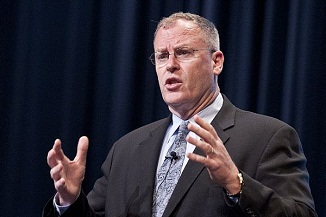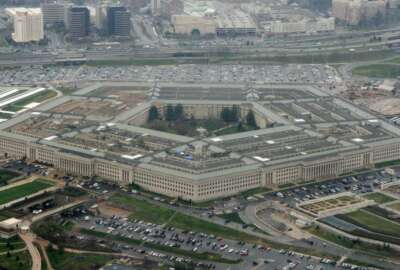Deadline set for contractors to pay $15/hour wage
In today's Federal Newscast, the Labor Department released the final rule yesterday to implement President Joe Biden's April executive order raising the minimum...
To listen to the Federal Newscast on your phone or mobile device, subscribe in PodcastOne or Apple Podcasts. The best listening experience on desktop can be found using Chrome, Firefox or Safari.
- Starting Jan. 30, federal contractors must pay a minimum of $15 an hour for all covered contracts. The Labor Department released the final rule yesterday to implement President Joe Biden’s April executive order raising the minimum wage for federal contracts. The final rule applies to all new contracts, as well as renewals and extensions of existing contracts. Among the contractors this raise will impact include those who provide janitorial and food services at national parks and other federal facilities, as well as healthcare workers at veterans’ hospitals or military bases.
- The Defense Department has some significant blind spots when it comes to civilian employees working overseas. A new review by DoD’s inspector general found HR officials don’t have an easy way to match individual employees against funded positions. Among other problems, that makes it hard to track vacancies. The IG also found unusually long hiring times for overseas jobs, even by federal government standards. On average, it took the military 225 days to fill overseas civilian positions last year.
- The number of bid protests to GAO are down for a second straight year. Contractors filed just under 1,900 protests in fiscal 2021, a 12% decrease over 2020. The Government Accountability Office’s annual bid protest report to Congress showed most of the categories remained consistent with the previous year. GAO says only 1% of all protests received hearings for the third year in a row. Its sustain rate also held steady at 15%. The one big surprise was the effectiveness rate, which measures how often an agency takes corrective action or the protest is sustained, that dropped to 48% from 51% in 2020.
- One of the biggest bills of the year is being pushed off by the Senate until after the Thanksgiving holiday. The 2022 defense authorization bill won’t get a full vote in the Senate until Nov. 29. Some lawmakers have been critical of how long it has taken leadership to bring the bill to the floor. The yearly legislation focuses on policy within the Defense Department. This year’s bill revamps the military justice system, authorizes the additional procurement of F-35s and requires women to sign up for the Selective Service so they can be drafted. The House has already passed its version of the bill.
- The Biden administration says all federal employees with a valid personal identity verification card can enter government facilities regardless of their vaccination status. Security guards at buildings operated by the General Services Administration won’t check vaccine cards at the door. The Safer Federal Workforce Task Force says that same policy will apply to federal contractors starting Jan. 18. That’s the deadline contractors have to comply with the administration’s vaccine mandate. (Federal News Network)
- 95% of federal employees are either partially or fully vaccinated, or have a medical or religious exception request pending or approved. 93% of the Transportation Security Administration has complied with the mandate. The compliance rate is at 98% for the IRS. The administration says it’s still reviewing exception requests and information from employees. Those who aren’t vaccinated yet will receive counseling. The White House says it expects more employees will become vaccinated over time. (Federal News Network)
- Defense contractor Huntington Ingalls Industries is keeping on employees who are refusing to get vaccinated. That’s despite a mandate requiring the vaccination of federal contractors. In a memo to employees, the company’s CEO claims some Huntington Ingalls employees are exempt because the mandate was not a condition of its shipbuilding contracts. The company says it will enforce the mandate where contracts stipulate the need for vaccinations. Huntington Ingalls employs about 44,000 people.
- The government is hoping the turkey isn’t the only thing you lock down this week. It’s become a familiar holiday warning. Federal agencies are cautioning critical infrastructure operators and other organizations to be vigilant about cyber crime heading into Thanksgiving. The holidays are proving to be an active time for hackers. Ransomware gangs pulled off high-profile attacks in May around Mother’s Day, and over Independence Day weekend in July. CISA and the FBI are urging organizations to follow best practices, like using multifactor authentication. And they say to be alert to phishing, unencrypted financial transactions and holiday shopping scams.
- What are the market trends in artificial intelligence, blockchain and 3D printing? The National Institute of Standards and Technology wants to get public feedback on the state of emerging technologies. The information will help feed a major report to Congress on advancing a more productive tech economy. Other areas include quantum computing, unmanned delivery systems and Internet-of-Things technologies. A big question for NIST is what agencies can do to help foster the adoption of emerging technologies. Comments are due to NIST by the end of January.
- Federal government lacks a strong pipeline of new digital workforce recruits, but the Government Accountability Office has some recommendations to fix that. A study of responses from agency chief data officers, and technology and information officers, finds support for a digital service academy, similar to military academies, to train future federal employees on advanced artificial intelligence, data science, cybersecurity and other in-demand skills. Tech leaders surveyed by GAO prefer a master’s degree pipeline over an undergraduate pipeline. One option could be to have a four-to-five-year combined undergraduate and master’s degree.
- A federal appeals court upheld a Postal Service regulator’s decision that’s led to higher mail prices. A three-judge panel with the U.S. Court of Appeals for the D.C. Circuit finds the Postal Regulatory Commission struck a careful balance last year, when it allowed USPS to set mail rates higher than the pace of inflation. The judges say the old rate system didn’t ensure the financial stability of USPS, but implemented a new system that still upholds predictable and stable rates. The commission also rejected calls from USPS to completely reset prices on its monopoly mail products. The high mail rates in question went into effect on Oct. 1. (Federal News Network)
- Top Democrats on the House Ways and Means Committee are asking Customs and Border Protection if persistent mail delays are hampering its mission. Oversight Subcommittee Chairman Bill Pascrell (D-N.J.) and Trade Subcommittee Chairman Earl Blumenauer (D-Ore.) asked CBP how much it spends on postage for official communication each year, and how much mail the agency receives annually. The lawmakers also asked CBP to describe how they have dealt with any recent delays in sending or receiving mail.
- The Patent and Trademark Office is delaying a new fee for certain patent applications by one year. A fee for original applications not filed in a DOC-X file format, except for design, plant or provision applications, would have taken effect Jan. 1, 2022, but the fee will now take effect Jan. 1, 2023. USPTO wants more time to test its IT systems as users submit more applications in the DOC-X file format, and the agency wants to give applicants more time to change their submissions to the right format. Applicants can test their submissions through the Patent Center’s training mode.
Copyright © 2024 Federal News Network. All rights reserved. This website is not intended for users located within the European Economic Area.
Eric White
Eric White is news anchor and Federal Drive producer at Federal News Network.
Follow @FEDERALNEWSCAST






